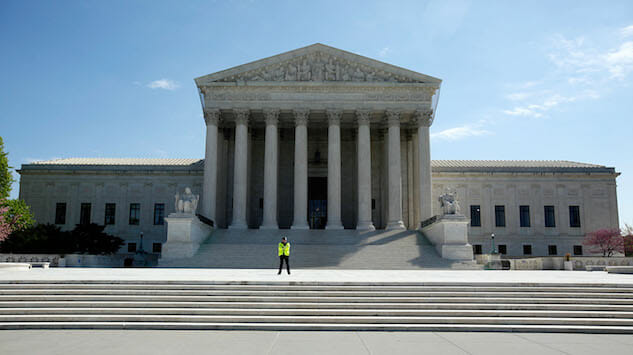The Supreme Court Avoided Addressing Partisan Gerrymandering Before Midterm Elections
Photo by Alex Wong/Getty
The Supreme Court ruled unanimously on Monday to keep district lines in Wisconsin and Maryland that were challenged by residents for partisan gerrymandering, reports The Washington Post. These controversial district maps will be used in the upcoming midterm elections, and justices sidestepped the question of whether or not these maps are legal.
The first case involved voters in Wisconsin who argued that the district maps were drawn to favor Republicans. The second case included voters in Maryland where the incumbent is not running for re-election in the upcoming midterms. The challengers stated the map of one district was drawn to elect a Democrat. The court ruled to keep the current district lines in both states.
According to CNN, the Maryland case did challenge an individual district but the case was still in the preliminary stage and the challengers received an unsigned opinion from the court. The opinion read:
“Even if we assume — contrary to the findings of the District Court — that plaintiffs were likely to succeed on the merits of their claims, the balance of equities and the public interest tilted against their request for a preliminary injunction,”
Basically, the Supreme Court stated the challengers lacked evidence that the district lines had caused “irreparable harm.” The Maryland case was pending in a lower court until the Supreme Court announced their decision. The case will now proceed in the lower court.
In Wisconsin, the challengers wanted the court to look at the entire state map as a whole and how it has been impacted by gerrymandering. The court ruled that they must assess the districts one at a time and the challengers must present them district by district.
But according to the Associated Press, Chief Justice John Roberts is seemingly giving the Wisconsin case a second chance. Normally, when the court finds that a challenger doesn’t have grounds to sue, they dismiss the case. Yet Roberts wrote that the Supreme Court’s role “is to vindicate the individual rights of the people appearing before it” and “this is not the usual case.” The Wisconsin case was sent back to three federal judges to see if they can modify their case to prove that they have grounds to sue. Justice Elana Kagan wrote:
“Courts — and in particular this court — will again be called on to redress extreme partisan gerrymanders. I am hopeful we will then step up to our responsibility to vindicate the Constitution against a contrary law.”
The Supreme Court constantly monitors how electoral maps are drawn in each state and are in charge of policing racial gerrymandering. However, the court has never found that a state’s partisan district lines were extreme enough for them to be policed as well. The Wisconsin and Maryland decisions were a technical approach to the partisan gerrymandering issue, and ultimately a way to avoid dealing with it before midterms.
The decision faced backlash from the American Civil Liberties Union, who called the court’s decision a “missed opportunity.” Sachin Chheda the director of the Fair Elections Project which organized the Wisconsin lawsuit said, “there is no vindication for the state’s rigging of the maps and disenfranchising of our voters here. We know as well today as we did when we started that our democracy is threatened and we need to return the power to the people.” The president of the Lawyers Committee for Civil Rights Under Law said the court “failed to provide long-awaited resolution and clarity on what constitutes unlawful gerrymandering.”
However, even if the Wisconsin case doesn’t make it back to the Supreme Court, there is another gerrymandering case pending Supreme Court review from North Carolina. The state is a midterm battleground state, with Republican’s holding 10 of 13 districts. The challengers are prepared and have plaintiffs challenging each district as instructed by the court in the Wisconsin case.